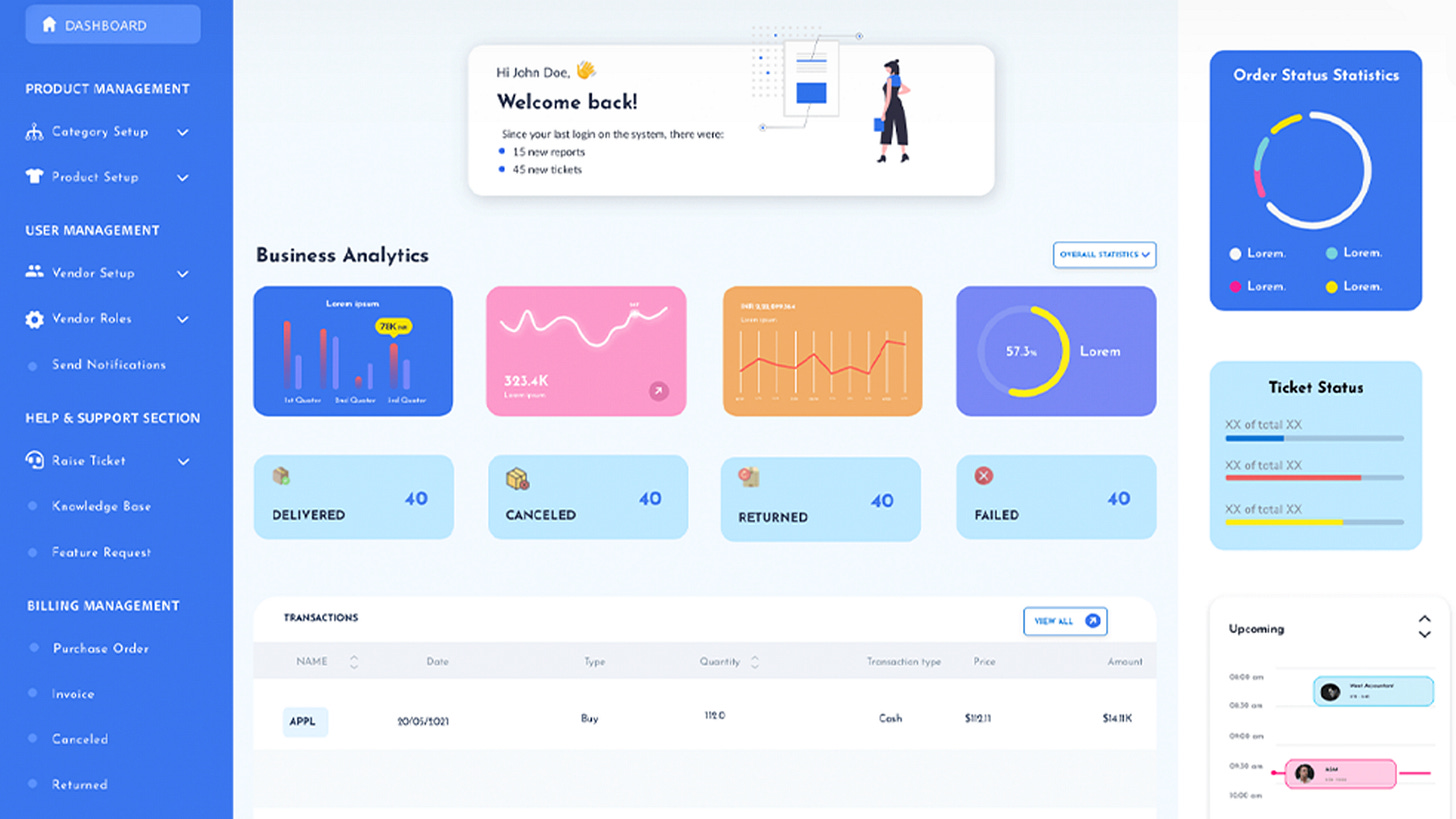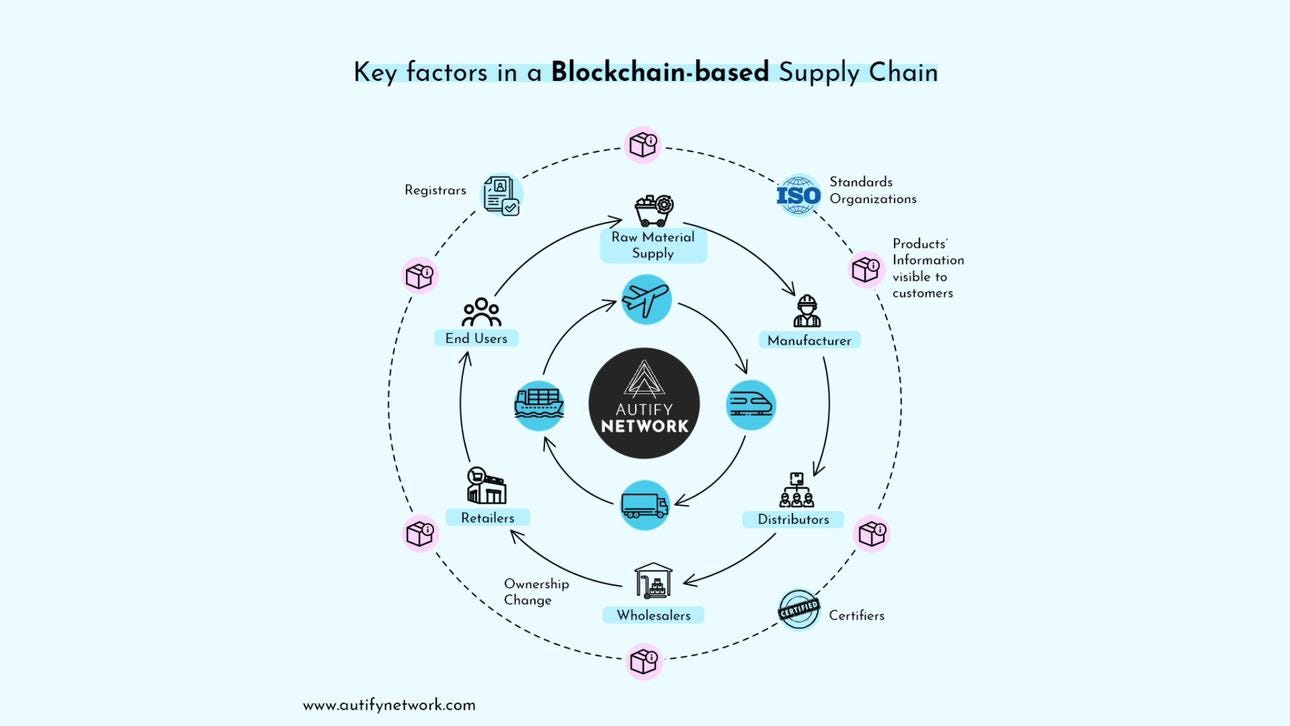Blockchain and Real World Supply Chain
Case study of Autify's trust protocol that leverages the power of blockchain and AI to increase transparency in the global supply chain
Fashion supply chains are notably complex, involving numerous stages from raw material sourcing to manufacturing, distribution, and retail. The journey of a single garment can span multiple countries and involve a web of suppliers, factories, and logistics providers. This complexity often leads to inefficiencies, delays, and a lack of transparency, making it difficult to track products accurately and ensure their authenticity.
Markets and supply chain distribution today are more expansive and global in nature than ever before in history. The advent of e-commerce has allowed products to be sold and shipped to almost anywhere in the world. Consumers today have the power to view and order any product online at any time of the day & from anywhere in the world.
Manufacturers work to keep up with the demand and are constantly looking for ways to reduce costs through substandard manufacturing and low-cost supply of materials and components. These global opportunities however have created and encouraged the growth of counterfeit goods and the theft of companies’ intellectual property.
Blockchain: A Game Changer
Blockchain technology offers a powerful solution to these challenges by introducing a decentralized, transparent, and secure system for recording transactions and tracking products. Let’s check out how blockchain is Revolutionizing supply chain efficiency in the Fashion Industry:
Traceability and Transparency: Blockchain provides a ledger of all transactions, making it easy to trace the journey of each product from origin to consumer. In the fashion industry, this means every step—from sourcing raw materials to manufacturing and shipping—can be documented and verified.
This transparency not only builds consumer trust but also helps brands ensure compliance with ethical standards and sustainability practices.
A recent survey conducted by IBM found that 73% of consumers are willing to pay a premium for products that offer complete transparency into their supply chain journey
Combatting Counterfeit Goods: Counterfeiting is one of the most discussed issues in the fashion industry costing billions of dollars annually. With the help of blockchain technology and its tamper-proof nature, it ensures that every product’s history is recorded and verified. This makes it virtually impossible for counterfeit goods to infiltrate the supply chain.
Consumers can scan a product's blockchain record to verify its authenticity, protecting both brands and customers from fraud.
A study by the International AntiCounterfeiting Coalition (IACC) revealed that 70% of consumers are concerned about the authenticity of the products they purchase online, highlighting the need for robust anti-counterfeiting measures.
Reducing Carbon Emissions: One of the most important concerns facing the fashion industry is its environmental impact, specifically carbon emissions. Blockchain technology can help reduce carbon footprints by streamlining supply chain processes. Blockchain allows for more effective transportation routes, fewer wasteful shipments, and lower energy use by giving precise, real-time data.
Furthermore, blockchain can validate sustainable processes and the use of environmentally friendly products, pushing firms to get greener.
The World Economic Forum estimates that by 2030, blockchain-enabled supply chain initiatives could reduce CO2 emissions by up to 15%, contributing to global efforts to combat climate change.
Promoting Sustainability: Sustainability is becoming the primary concern in the fashion industry, and blockchain technology helps to achieve this aim by encouraging environmentally friendly practices. Blockchain technology can track the use of sustainable resources and verify that ethical labor standards are maintained throughout the supply chain. It can also enable transparency across a product's lifecycle, from raw material purchasing to manufacturing, distribution, and disposal.
This broad visibility encourages companies to implement sustainable practices and empowers consumers to make informed, environmentally conscious decisions.
According to a report by Deloitte, implementing blockchain technology in the fashion supply chain can lead to a 50% reduction in administrative costs and a 20% increase in overall efficiency.
Ethical Sourcing: Blockchain technology also ensures that raw materials are sourced ethically by providing verifiable information about their origin. This allows companies to ensure that their products are manufactured from resources that are socially and environmentally responsible.
Ethical sourcing contributes to fair labor standards and promotes sustainable agricultural and extraction methods.
LCA ( Life cycle Assessment): A system for evaluating the environmental impact of products across their whole lifecycle, from raw material extraction to manufacture, use, and disposal. Blockchain technology can combine LCA data, resulting in a transparent and immutable record of each product's environmental impact.
This helps businesses to identify areas for improvement in their sustainability operations and customers to make informed purchasing decisions based on the environmental impact of the products they buy.
A study by the Environmental Protection Agency found that implementing LCA can reduce a product’s environmental impact through more efficient resource use and waste management.
From Data to Impact
A study by the World Wildlife Fund (WWF) revealed that implementing blockchain technology in the supply chain could help reduce up to 30% of the environmental impact of textile production by ensuring compliance with sustainability standards.
According to a survey by IBM, 70% of consumers believe that transparency is important, and 53% are willing to pay a premium for brands that provide it. Blockchain helps meet this demand by providing detailed and trustworthy supply chain information.
A report by the International Chamber of Commerce (ICC) projects that blockchain could reduce the global trade of counterfeit goods by up to 50% by providing verifiable product provenance.
The Carbon Trust estimates that blockchain could help reduce emissions in the supply chain by 15-20% by 2030 through enhanced efficiency and better resource management.
Industry Insights
LVMH
A luxury goods conglomerate has adopted blockchain technology to track the environmental impact of its products. This ensures full transparency and compliance with sustainability goals. By leveraging blockchain, the company is setting new standards in eco-friendly practices and reinforcing its commitment to a sustainable future.
H&M
H&M Group is exploring blockchain solutions to enhance supply chain transparency and efficiency, aiming to reduce carbon emissions associated with production and logistics.
Provenance
A leading blockchain technology company collaborates with brands to meticulously track the origins and authenticity of their products. This innovative partnership provides consumers with verifiable and transparent information about their purchases, ensuring trust and confidence in the products they buy. By leveraging blockchain, the company is revolutionizing the way brands and consumers interact
A Case study: Autify Network
Autify Network is developing a revolutionary trust protocol that leverages the power of blockchain and AI to increase transparency in the global supply chain. The company aims to create a decentralized ecosystem that ensures transparency, efficiency, and trust for all stakeholders involved in the supply chain of luxury fashion products.
In September 2022, Autify Network successfully raised $1.9 million in venture capital and grants funding from Loop Ventures, NEAR Foundation, SIA Foundation, Stellar Community Fund, Biconomy, and Filecoin, marking a significant milestone in its growth and development to revolutionize supply chain management in the fashion industry.
They are addressing an extremely complex problem that affects companies worldwide, resulting in losses exceeding $5 trillion due to supply chain inefficiencies, counterfeiting, and a lack of transparency.
From counterfeit goods to unethical labor practices, the issues have tarnished the reputation of some of the world's most famous fashion brands. Blockchain technology is said to be a promising solution to these problems.
Autify network brings you the solution, they are one of the few developing modern, modular, and comprehensive supply chain management solutions catering to brands, vendors, suppliers, and end consumers. It is one of their standout features, setting them apart from the competition.
By offering exceptional flexibility, and allowing easy customization based on business needs and size, all at a reasonable cost.
Supply chain management:
Autify Network is building an end-to-end supply chain management platform for businesses to manage the flow of goods and services from the point of origin to the point of consumption. Their platform will provide real-time visibility into the movement of goods and enable businesses to adapt to changes in demand or supply quickly. They can also help reduce costs and improve efficiency by automating routine tasks and streamlining workflows.
Inventory management
Order management
Transportation management
Warehouse management
Supplier management
Demand planning
Analytics and Reporting
Supply chain traceability:
They are building a supply chain traceability platform to track the provenance of goods, including their origin, movement, and ownership. This can help to prevent counterfeiting and ensure the authenticity and quality of products. Their Platform will make it possible for different actors along the supply chain to have different roles and privileges.
Their system will provide real-time tracking of all players involved in the product journey from field to end consumer. By simply scanning a QR or NFC code, customers can easily access all relevant details about the product. They will keep a permanent and immutable record of transactions, which can help to prevent fraud, tampering, and errors in supply chain data. Supply chain participants can reduce the time and cost associated with tracking and verifying the authenticity of goods, and improve the efficiency of supply chain operations.
In addition to the supply chain management and traceability platform, Autify Network is also building several other innovative products:
Sustainability track and trace: Autify Network’s sustainability track and trace solution will allow companies to track the environmental and social impact of their supply chains, including carbon emissions, water usage, and labor standards. By providing transparent and verifiable sustainability data, they will help companies meet their sustainability goals and improve their reputation with consumers.
Autify Verified a Decentralized Sourcing Platform: Autify Network’s verified vendor sourcing will provide a trusted platform for companies to find and connect with verified suppliers and service providers. By using blockchain-based identity verification and reputation scoring, they can ensure the reliability and quality of their vendors and simplify the procurement process for their clients.
Integrating AI and Computer Vision for automation: They are leveraging the power of AI and computer vision to improve item tracking and identification within the supply chain. This will enable them to provide more accurate and efficient traceability solutions and help their clients reduce losses and improve inventory management.
B2B Cross-Border Payment Module: Autify Network’s cross-border payment platform will allow businesses to make secure and efficient payments across borders. By eliminating intermediaries and reducing transaction costs, they will help businesses expand their global reach and streamline their international operations.
Their platform provides real-time visibility into the movement of goods and enables businesses to quickly adapt to changes in demand or supply. They also help reduce costs and improve efficiency by automating routine tasks and streamlining workflows.
Sources and References:
https://www.unep.org/news-and-stories/story/environmental-costs-fast-fashion
https://issuu.com/fashionrevolution/docs/fr_fashiontransparencyindex2020
https://www.weforum.org/agenda/2020/01/fashion-industry-carbon-unsustainable-environment-pollution/
https://www.bloomberg.com/graphics/2022-fashion-industry-environmental-impact/
https://www.mckinsey.com/industries/retail/our-insights/state-of-fashion
https://www.unep.org/news-and-stories/story/putting-brakes-fast-fashion
https://www.unep.org/news-and-stories/story/environmental-costs-fast-fashion






